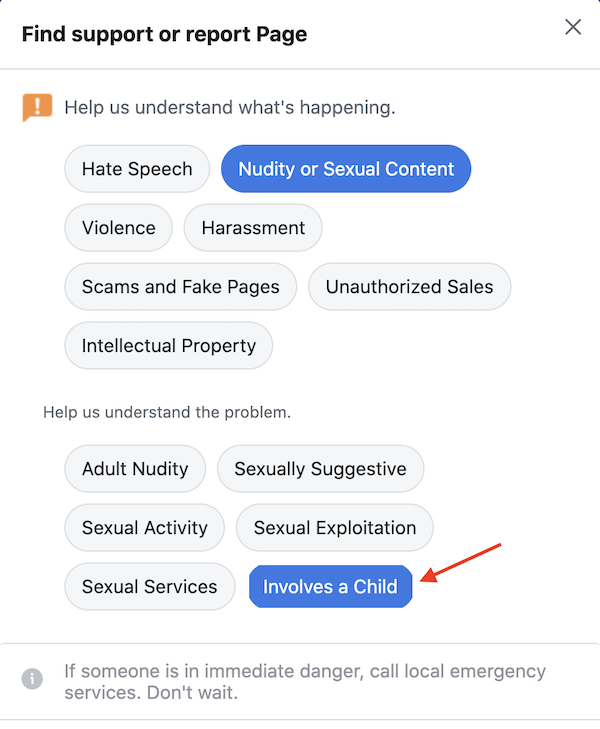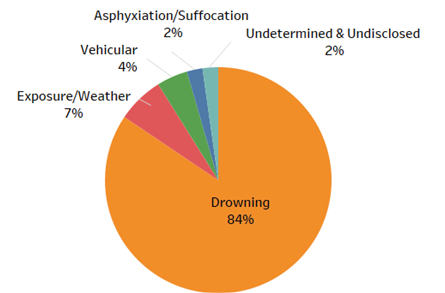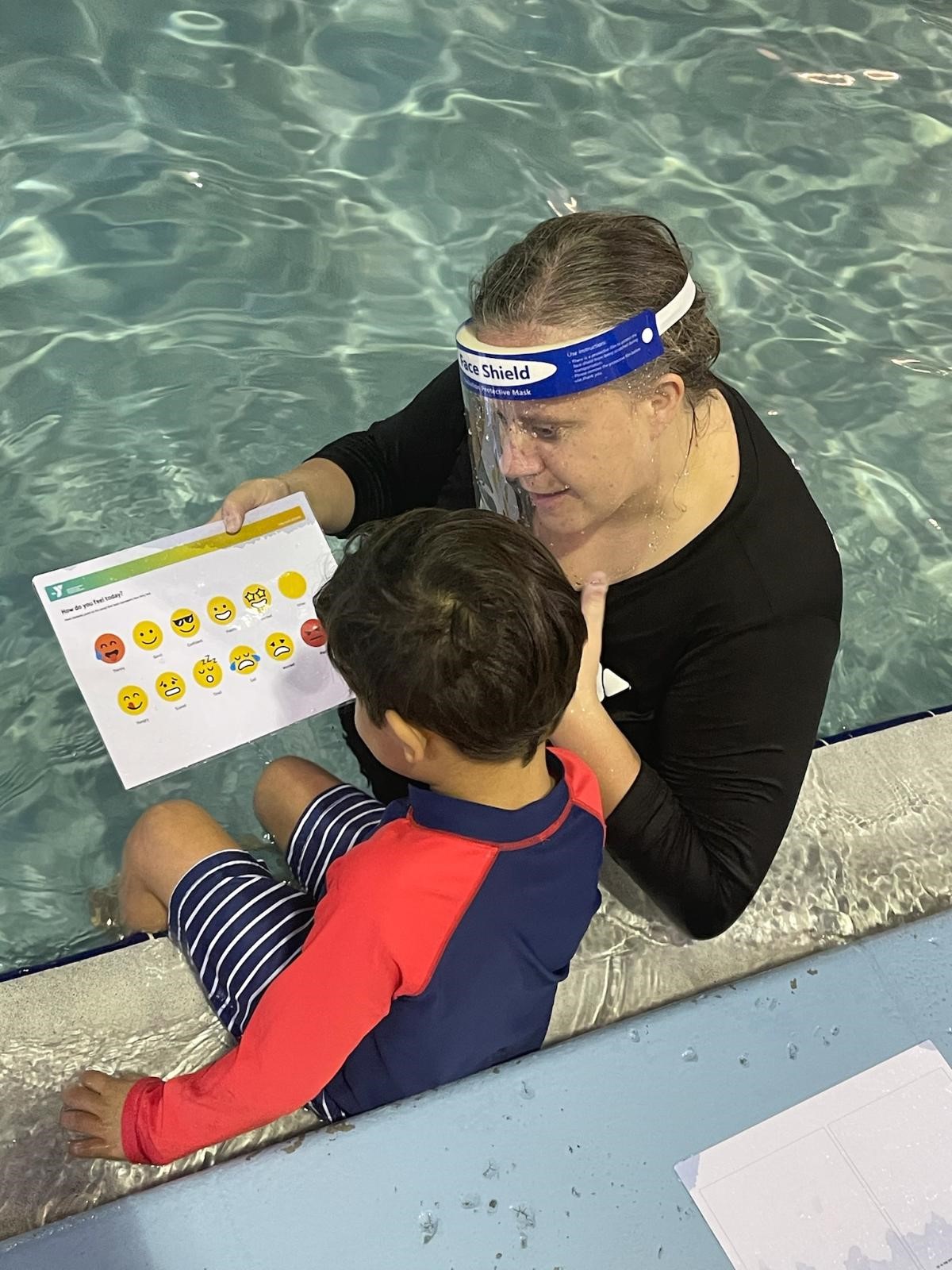Child sexual abuse material and child sex trafficking
1. Never share content, even in an attempt to make a report
2. Report it to the platform where you found it










You’ve just got to love man’s best friend. Law enforcement officials in DeKalb County, Tennessee report that a sheriff’s K9 located and helped rescue a 6-year-old girl who had been abducted by her father on May 26.
The child was found by a Rutherford County sheriff’s K9, Fred and his handler Deputy Richard Tidwell.
Fox Carolina said deputies tracked the suspect, Nicholas Reeder and his daughter, Kinzleigh to a home in DeKalb County. Reeder has been charged with child abuse or neglect in the case. He is currently being held on $175,000 bond.
According to DeKalb County Sheriff Patrick Ray, Reeder was tracked to the area of the home, with the deputy and K9 called in where the pair was believed to be located behind a home.
Tidwell obtained an item belonging to Nicholas Reeder and the police bloodhound hit on it, following the scent along a footpath behind the home, finally tracking to an outbuilding.
Once the K9 sniffed the doorknob, he sat down, indicating this was where Reeder was likely to be with his daughter. Deputies made entry to the shed and located the young girl.
We made entry into the building and discovered the suspect and child in the back of the shed behind blankets that were hanging from a makeshift clothesline,” Rutherford County Sheriff’s Sgt. James Holloway said.
Nicholas Reeder was taken into custody, and Kinzleigh was turned over to DeKalb County deputies.
“He licked her face, and she gave him a big hug,” Tidwell said of the interaction between the K9 and the young girl, according to a Facebook post from the Rutherford County Sheriff’s Office.
Tidwell said that after the dog found the young girl, he gave him a special treat.
“I praised him and loved on him,” Tidwell said. “I pulled the chicken reward out of my pocket. He ate the chicken and wanted to meet other people as if to say, ‘Look what I’ve done.’”
Sheriff Ray was grateful for the assistance the agency received from various law enforcement partners.
He singled out the Rutherford County Sheriff’s Office, Rutherford County Fire & Rescue, StormPoint Drones, the Tennessee Highway Patrol, Smithville-DeKalb County Rescue Squad, DeKalb EMS, the FBI and the Tennessee Bureau of Investigation, who all participated in the search for young Kinzleigh.
Ray said the building where the pair was found was a small outbuilding with poor ventilation that “reeked of ammonia,” Ray said, according to WKRN. He noted that the building had been boarded with metal, and there was little food or water. He said they had been using a five-gallon bucket as a makeshift toilet.
The sheriff said Kinzleigh had been removed from her father’s custody on March 18 after they were found camped out under a bridge while a creek was rising in the area. He was arrested at that time on charges of child abuse and neglect, and the child was placed in temporary custody of a family member.
For some unknown reason, the Tennessee Department of Children’s Services (DCS) allowed Reeder to live in the same household as his daughter.
Despite the fact the child went missing in late May, it wasn’t until nearly a month later, June 21 when DCS found the time to file a missing child report when they were granted custody of Kinzleigh.
The Rutherford County Sheriff’s Office said this was Fred’s first recovery since he joined the department in 2020.
It’s a fear many parents with children on the autism spectrum say they live with every day: that their child will bolt out the door at any second and head straight to the nearest body of water, drawn to it as if by some powerful magnetic force.
The behavior is known as wandering, or eloping, and it’s something that parents of nearly half of children with autism say they’ve experienced. Many of these children exhibit a diminished sense of fear, making a beeline to things they’re attracted to that could place them in harm’s way – most often natural bodies of water like ponds, creeks or drainage ditches – but also highways, trains, construction equipment, firetrucks or even roadway signs.
Over a 10-year period, 1,516 children with autism were reported missing to the National Center for Missing & Exploited Children (NCMEC). Of those, 64 children were recovered deceased with drowning the leading cause of death. Sadly, the number is likely much higher because children who wander often reach water before they can be reported missing and their deaths are not distinguished from other accidental drownings. Kids on the autism spectrum are 160 times more likely to die from drowning compared to the general population of children, according to the American Journal of Public Health.

NCMEC’s 10-year analysis, from 2011 to 2020, shows causes of accidental deaths after children wander from safe environments.
Parents use all kinds of strategies and technologies to keep their children safe – sensors to detect when a door is opened, enlisting help from neighbors, cameras, special locks, tracking devices. Now that Covid-19 restrictions are lifting, parents have another potential lifeline: swimming lessons.
Before the pandemic, the YMCA was teaching swimming to children with disabilities as part of a pilot program. Now, with pools opening back up, the organization is bolstering its inclusive swimming program, providing instructors with more training and giving them the tools they need to work with children who may be nonverbal or have difficulty communicating.
“As communities across the country reopen, we want to remind everyone that water safety isn’t just fun – it’s essential,” said Lindsay Mondick, director of innovative priorities at Y-USA. “The Y’s classes provide a safe, fun and healthy environment for children with disabilities to learn important water safety skills in a way that can ultimately save their lives if ever faced with an unexpected situation with water.”
Each child on the autism spectrum is unique, so the YMCA has been working with parents to meet their individual needs, Mondick said. Some want private lessons for their children, while others believe their kids would benefit from swimming classes with their peers, she said.

Child is taught swimming lessons at YMCA using visual aids.
The National Autism Association (NAA) has been working with the organization since 2012 and has a list of Y’s that offer inclusive classes on its website, https://nationalautismassociation.org/resources/autism-safety-facts/swimming-instructions/. Other organizations, including the Red Cross, offer classes, and the NAA tells parents to Google “swimming lessons and special needs” if they don’t have a Y in their community.
“We recommend swimming lessons as one of the first safeguards parents should get for their children, a pretty critical piece,” said Lori McIIwain, co-founder of the NAA and mother of a son with autism. “It’s one layer.”
Parents interested in swimming lessons with Red Cross-trained instructors should contact their local parks and recreation departments, said Connie Harvey, director of Aquatics Centennial Initiatives. The Red Cross offers lessons at 3,500 aquatic facilities throughout the United States, she said.
The need for swimming lessons for children on the autism spectrum is growing as the number of children diagnosed with autism continues to grow. Today, one in 54 children in the United States are on the autism spectrum, compared to one in 68 in 2014, according to the Centers for Disease Control and Prevention.
McIIwain said her organization encourages parents to have their children take at least one swimming lesson while wearing their clothes and shoes as would be the case if they wandered to a body of water. The NAA tracks wandering cases and counts about 20 a month, including two to three deaths, often learning about them when a parent calls to report their child drowned after wandering.
When parents say swimming lessons wouldn’t work for their child because he or she doesn’t like water, including taking showers and brushing their teeth, McIIwain says her organization encourages them to get swimming lessons anyway. Children who don’t like water may still be attracted to bodies of water in natural settings, and there are strategies to ease them into swimming lessons, she said.
Mondick says sometimes just teaching these children that they must ask for permission before ever getting in the water can be a lifesaver. The NAA agrees and encourages parents to put water play on a visual schedule for their children so they have a structured routine.
“It’s actually really simple, but it works,” McIIwain said.
For more information, visit: https://www.missingkids.org/theissues/autism. For our next NCMEC autism training class for law enforcement, visit: https://connect.missingkids.org.
RED CROSS - TAKE A CLASS (English
OR
RED CROSS - TAKE A CLASS (Spanish)
Monica Grover: On May 25, 1979, 6-year-old Etan Patz left his house to go to school.
Unfortunately, he never made it to his bus.
Decades later, we’d learn that he was kidnapped and murdered that same day. In 1983, President Ronald Reagan declared May 25 National Missing Children’s Day in Etan’s memory.
On the last episode of Inside the FBI, we gave you a look at how the FBI responds in the immediate aftermath of a child’s disappearance, and how parents can keep their families safe.
But what happens when a child disappears for months or years?
This time around, we’ll delve into some of our longtime missing children’s cases—because the FBI never forgets a missing kid, no matter how long they’ve been gone.
We’ll also provide a window into our efforts to track down some of these children and explain how you can help us bring them home.
I’m Monica Grover, and this is Inside the FBI.
* * *
Grover: Arianna Fitts was only 2 years old when she was last seen in February 2016 in Oakland, California. We learned she was missing after the body of her mother, Nicole, was discovered in a San Francisco park that April.
But since then, there have been no signs of Arianna, and Nicole’s killer remains unknown.
Over the past five years, the FBI and the San Francisco Police Department have worked together to find Arianna and, hopefully, to bring Nicole’s killer to justice, too. Despite the passage of time, investigators are still actively searching for Arianna.
According to Scott Schelble, the assistant special agent in charge of the FBI’s San Francisco Field Office, the FBI does everything in its power to find a missing child until they’re either found alive or their remains are recovered.
Scott Schelble: It doesn’t matter if it has been one day, one week, five years, or 10 years. I think the American public expect that of us, and I think every parent would have that same expectation: that we are not going to give up looking for a child just because some time has passed.
Grover: Investigations can get more complicated with time, but the same wait that can devastate victims’ families can also allow technological advances to emerge. We hope that one of these breakthroughs may move this case—and others—forward.
Schelble: We do not look at Arianna’s disappearance as a cold case or as a case that is put onto a back burner. This is a case we are actively looking at, and it’s going to remain an active case until we are able to resolve it.
The FBI is working very closely with the San Francisco Police Department, and we are in this side-by-side to the conducting of interviews, the collecting of information, the analysis of forensic evidence, and following every lead until we are able to determine both what happened to Arianna, as well as what happened to Nicole, and to hold those people accountable.
Grover: If you have any information about Arianna’s disappearance or Nicole’s murder, please contact the FBI San Francisco Field Office at (415) 553-7400 or visit tips.fbi.gov. Any piece of information may be helpful.
Schelble: We want the public to remember every detail that they can and to share that information with us. No detail is unimportant. No detail is irrelevant. We are putting together a puzzle here, and every piece plays a critical role. So what we’re asking from the public, if you remember something—however innocuous it might seem—please contact us, even if you have previously talked with law enforcement.
* * *
Grover: In 1974, Margaret Ellen Fox, then 14, placed an ad in her local newspaper offering her babysitting services for the summer. On June 24, she boarded a bus near her hometown of Burlington, New Jersey, to travel about 10 miles to the nearby town of Mount Holly. There, she planned to meet someone she thought was interested in hiring her as a babysitter.
She never returned home.
Not long after her disappearance, ransom notes arrived at the Fox family’s house, and an anonymous caller claiming to have Margaret in his custody demanded $10,000 in exchange for her safe return home.
We’re gonna play that audio for you.
Man’s voice on recording: $10,000 might be a lot of bread, but your daughter’s life is the buttered topping.
Grover: According to Special Agent Bradley Zartman—who is working on Margaret’s case 47 years later—investigators traced the foreboding phone call to a local A&P supermarket. However, the caller’s identity remains unknown to this day.
Despite these early setbacks, the FBI and the local police have never forgotten Margaret, and they’ve spent nearly five decades trying to figure out what happened to her.
Bradley Zartman: So while it’s been 47 years, we're not gonna stop looking for her, we’re not gonna stop trying to understand what may have happened. And while it may get harder and harder each year, I'm hoping with new inventions in forensic science and those sort of things, maybe we can reanalyze, keep poring through the case, and figure out some new avenues in order to pursue what may have happened.
Grover: Her community hasn’t forgotten her, either. In fact, Burlington citizens talk about Margaret regularly. As the city’s police chief, John Fine, told us:
John Fine: I think that this is an open wound that the city would love to be healed. In Burlington City, this is still often talked about when you walk into a local diner or a local pizza shop.
This past week I went into the local deli, and her poster of being missing is still posted on the board and at the counter still today in Burlington City, where the deli is located around the corner from her house.
There’s still family that are local. We still keep in touch with the brother, who always wanted to know what happened to his sister. And as a parent, we always think about, if this was my daughter or if this was my sister, that in the event that she is passed away, that we could give her a proper burial.
Grover: If you think you have any information on Margaret’s disappearance, please contact the FBI’s Newark Field Office at (973) 792-3000 or tips.fbi.gov. The bureau is offering a $25,000 reward for information that leads to the arrest and/or conviction of anyone who may be responsible for Margaret’s disappearance.
Zartman: Literally every day, if not year, the people that were alive and in the area at that time are no longer here. We lose people, and, you know, along with them, we could lose witnesses, we could lose facts, we could lose that evidence. So, just as the chief said, every little bit of information that someone has, no matter how minute or far-fetched it might seem, we’ll look into it.
* * *
Grover: On June 4, 2010, 7-year-old Kyron Richard Horman vanished after attending a science fair at Skyline Elementary School in Portland, Oregon, that morning. He was last seen wearing a black t-shirt with the letters “CSI” and a handprint graphic across the front.
In mere hours, the FBI joined the hunt for Kyron, explains Case Agent Brendan Dennard.
Brendan Dennard: Since that first night, the FBI has partnered with the lead investigative agency, the Multnomah County Sheriff’s Office, to help find Kyron. In those early days of the case, the FBI provided dozens of agents to help do neighborhood canvasses and interviews.
Over the next few weeks and months, we also brought in specially trained agents from the FBI’s Child Abduction Rapid Deployment—or CARD—team, digital forensic experts, and crisis management experts to support the large influx of information and tips.
Grover: The FBI has also supported the search for Kyron by providing backup from its Behavioral Analysis Unit and signal-boosting national publicity initiatives, he said.
The Bureau’s wide-ranging network of special agents—who are based across the country and around the globe—has enabled the FBI to vet tips from beyond Kyron’s backyard, he added.
Dennard: Everyone who has worked on this case for the past decade has one overriding goal: to bring Kyron home. Kyron and his family deserve no less than that.
It doesn’t matter whether you are a detective, deputy, officer, prosecutor, or an FBI agent—that need to find Kyron and provide answers to his family is something we all deeply feel.
Grover: If you have any information about Kyron’s disappearance, contact the FBI Portland Field Office at (503) 224-4181 or tips.fbi.gov.
* * *
Grover: On the last episode of Inside the FBI, we mentioned that “stranger danger” abductions are relatively rare—and that abducted children are most often taken by someone they know or their family knows. And in some cases, it’s the child’s very own parent that does the kidnapping. In these parental kidnappings, one parent illegally denies the other parent access to their own child.
Parental kidnappings can happen within the U.S., but they get more complicated when a mom or dad takes their child overseas. That parent may think they’ve evaded the grasp of American law, but that’s not always the case. The FBI has international offices—known as legal attachés—and can join forces with host-country authorities to track down missing children and reconnect them with their parents back home.
One such case that we’ve been tracking for years is that of Amina and Belel Kandil.
When 10-year-old Amina and her 8-year-old brother Belel left their Virginia home with their father, Ahmed Kandil, in August 2014, they thought they were flying to Canada to visit family—but instead, he took them to Turkey. A warrant is out for Ahmed’s arrest.
FBI Special Agent Stacey Sullivan, who’s working the case out of our Norfolk, Virginia office, said the Bureau has thoughts on the teenagers’ current whereabouts.
Stacey Sullivan: We do have quite a few ideas of where they could be. We have narrowed it down and believe them primarily to be with their father, yes. We don’t believe he would let them out of his sight at this point. And his father has very strong family ties to include his own parents, as well as some other relatives that reside in Egypt, so based on everything so far, potentially, we believe they are in Egypt.
Grover: Sullivan is working closely with the FBI’s legal attaché office in Egypt and the U.S. State Department to track down the siblings. And although Amina and Belel have been missing for almost seven years—presumably overseas—the FBI is still committed to finding them.
Sullivan said their mother’s anguish has amplified the personal significance of closing this case.
Sullivan: I see the turmoil that she has to encounter. She writes to them every single day in a journal, letting them know how much she misses them and that she’s never stopped looking for them.
We never know what they’ve been told or what they believe now, having been separated from her for so long. So, it’s important for me, also, for them to know that their mother never gave up and that they can have communication again with her and rebuild that relationship that was taken from them.
Grover: If you have any information regarding Amina and Belel, you can contact the FBI Norfolk Field Office at (757) 455-0100 or send us a tip at tips.fbi.gov.
Sullivan: We have had various tips come in over the years, and we have traced them all down, so the tip line has been very productive for us.
Grover: Sullivan encourages people to especially keep an eye out for them online, and to keep in mind that they might even be going by different names.
Sullivan: I’m sure, with this day and age, a lot of people are online. They may have different identities online, but if they were to see them or think they saw them, any tip would be gratefully appreciated.
Grover: Tips like these could be crucial to helping us find Amina and Belel and put them back in contact with their mother, who misses them and wants to know they are safe.
* * *
Grover: Thanks for joining us as we learned how the FBI is pressing on to reunite families that have been torn apart by child abductions for years—or even decades.
For photos and more information about Arianna, Margaret, Kyron, and Amina and Belel, plus other missing kids we’re still searching for, please visit fbi.gov/missing2021.
If you have any information about any of these children, please contact us at tips.fbi.gov or call your local FBI field office.
This has been another production of Inside the FBI. You can follow us on your favorite podcast player, including Spotify, Apple Podcasts, or Google Podcasts. You can also subscribe to email alerts about new episodes at fbi.gov/podcasts.
I’m Monica Grover from the FBI’s Office of Public Affairs. Thanks again for tuning in.
Case Highlights Growing Online Crime with Devastating Real-Life Consequences
The doors were locked, the alarm system was on, and the 13-year-old girl never left her room. But a child predator was able to reach her simply because she was tricked into connecting with him online.
The link between Presley (her name has been changed to protect her identity) and someone she believed was another teenage girl named K.C. started out as a friendly exchange over a popular messaging app. They sent each other occasional messages and pictures of their outfits over a few weeks.
One mildly revealing photo from Presley, however, gave K.C.—who was actually a grown man in Florida named Justin Richard Testani—an opening to begin his threats. He said he would share the photo and spread rumors about her to friends and family if she didn’t do as he asked.
“She let her guard down,” her mother said. “She let her guard down because she thought it was another teenage girl.”
The demands and threats escalated quickly from there. According to FBI investigators, Testani told Presley he would rape and kill her and her loved ones if she didn’t perform the increasingly graphic and extreme acts he demanded over a video call.
Presley had become a victim of sextortion. With the internet allowing predators to hide their identities and easily reach thousands of young people over games and apps, it’s a crime the FBI is seeing in alarming and rising numbers.
To keep Presley from hanging up, the predator used details he’d gathered from their conversations and information she’d posted online to make his threats specific and terrifying. According to Presley’s mother, he told her, “I know where your mom works. If you don’t do what I’m telling you to do, I’ll go kill her.”
He told Presley he knew where she lived. He knew where she went to school. He knew how to get to her friends. “She was convinced it was someone who was standing right outside the door,” Presley’s mother said. “Someone who could get to her immediately.”
Presley was desperate and terrified when she finally reached her mom to ask for help.
We have several resources to help caregivers and young people understand what sextortion is, how to protect against it, and how to talk about it.
If a young person is being exploited, they are the victim of a crime and should report it. Contact your local FBI field office, call 1-800-CALL-FBI, or report it online at tips.fbi.gov.
Learn more at fbi.gov/sextortion.
Presley’s mother said her daughter called at her first opportunity to break the phone connection with the predator. Testani wanted to take over one of her social media accounts so he could use it to contact her friends, giving him the ability to deceive and exploit another group of young girls. But as he took over her existing account, he needed her to create a new one for herself so they would still be connected online.
As she was carrying out that demand, Presley had a chance to call for help. “He told her she had two minutes to get it done,” her mother said. “When they broke that connection, she felt she could call me.”
Presley’s mother and stepfather raced home. And although they were confused about what was happening, they couldn’t mistake the terror in Presley’s voice. Her stepfather reached her first and immediately called the police when he saw what was happening on her phone.
Presley’s bravery in reporting helped investigators find the man who terrorized her. Testani pleaded guilty to child sexual exploitation in February and was sentenced to 60 years in federal prison on August 6, 2020.
Special Agent Kevin Kaufman, who investigated the case for the FBI in Tampa with local law enforcement, said that they identified several other victims across the country—some as young as 10 years old.
The investigation showed that Testani obtained the login information for other victims’ social media accounts, which allowed him to message hundreds of other young people.
The length of Testani’s sentence reflects the number of children he hurt, the extreme nature of his crimes, and the devastating effects this type of sexual violence has on its victims. Presley’s mother said her daughter is still dealing with depression and anxiety, has trouble concentrating in school, and experiences panic attacks.
The fact that Presley never met Testani in person and never even saw his face only amplified her fear. This man who hurt her could be anyone, anywhere. “That’s why she went from a social butterfly to absolutely terrified to leave the house,” her mother said.
Kaufman stressed that this case and the many he sees like it are a reminder to children, teens, and those who love and care for them to rethink dated assumptions about where children are safe and at risk.
“Parents—and kids, too—think that if they are home, they are in their safe haven,” Kaufman said. “But these are professional online predators who have perfected their craft. You’re putting them up against 11-, 12-, 13-year-old children. I have seen victims who were straight-A students. I’ve seen victims who were adults, for that matter.”
Presley’s mother hopes that parents and caregivers shift the conversations they’re having with their children. “We teach our children from the time they are old enough to walk about stranger danger,” she said. “We teach them what to do if someone says something to you or touches you in the wrong way, but we don’t teach them about stranger danger online.”
She wants kids and parents both to understand that sextortion can happen so they can recognize it as a crime and can act. Many parents don’t know enough about the current online environment and what their children may be doing.
Kaufman agrees. “Know what these applications can do,” he said. Parents may not know that a texting app also allows their child to video chat with multiple people at once or that their children are getting friend requests from strangers and accepting them without a second thought. “People can portray themselves to be anyone online,” Presley’s mom said. “Know that you know who you’re talking to.”
“We teach our children from the time they are old enough to walk about stranger danger. We teach them what to do if someone says something to you or touches you in the wrong way, but we don’t teach them about stranger danger online.”
Mother of sextortion victim
Additionally, Kaufman warns that many people aren’t aware of easy-to-download applications that let someone record anything online, even without the other person knowing. Any so-called private or “disappearing” interaction can be saved and shared.
Presley’s case, with the perpetrator’s pattern of taking over his victims’ accounts, shows that even if a message is from a friend’s account, there can still be a risk. The best protection against that uncertainty is to avoid doing anything in front of a screen that you wouldn’t be comfortable doing in real life.
“I fear the belief some people—especially kids—have that if it happens behind a screen, it’s not real,” Presley’s mom said. Her family’s experience shows the risks are real, and the possibility of long-term harm is, too.
So what’s the most important thing parents and caregivers can do? Presley herself says that it’s to be available if your kids need help. If your child is afraid of getting in trouble for downloading a forbidden app or breaking another family rule, they may not ask for help if they become a victim of sextortion. This means they’ll suffer alone, and the predator will be free to target another victim.
And Presley also has a message for young people spending time online: “Everything is not always as it seems. It is easy for people to act like someone they are not on the internet. Don’t believe everything you are told. If you are put in one of these situations, one of the most important things to remember is that although they tell you they have all the power, you are the one in control. Don’t be afraid to speak up. You are not alone.”